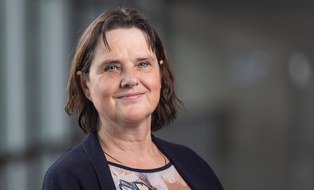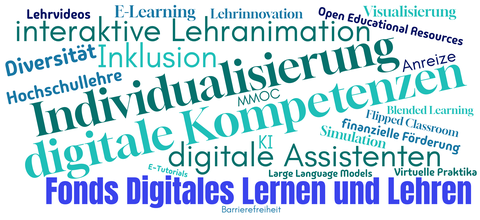Digital Learning and Teaching Fund (Fonds DLL)
The Digital Learning and Teaching Fund, formerly the Multimedia Fund, is an instrument for the (further) development of e-learning and thus pursues the sustainable improvement of the quality of teaching at TU Dresden.
| Current call for proposals Fund DLL 2025/26 |
| Form for submission for funding |
TU Dresden has been providing central funding for the implementation of digital learning and teaching scenarios since 2006. Over 150 projects have been successfully implemented in the past funding periods. Currently, six projects with a total volume of EUR 99,500 are being funded that focus on digital learning and teaching.
By funding e-learning projects, the DLL fund pursues the following overarching goals in terms of quality assurance and sustainability:
- Promotion of individuality and interaction (individualization of learning processes),
- Support for teaching activities (promotion of digital skills),
- New edition or expansion of existing offerings, taking into account diversity and accessibility, if possible as an Open Educational Resource or Practice (OER/OEP) and thus the expansion of the teaching offer so that it is available to a larger group of people.
What is new?
For the 2025/2026 funding period, the Digital Learning and Teaching Fund (DLL Fund) will be fundamentally redesigned in consultation with the Vice-Rectorate Education and the e-learning officers. The planned changes, which include trying out new application formats and reducing administrative work, will be tested as part of a one-year pilot phase. The strengthening of the digital teaching teams with a separate budget of EUR 10,000 can be implemented in the pilot phase using the remaining funds available from the temporarily unfilled staff position at ZiLL. This results in the following changes:
1) Change in the application process
In future, interested parties will first submit brief outlines of ideas to apply for funding. From these, ten submissions will be drawn by lot to present their projects in a pitch in front of a jury. The jury is made up of representatives from various status groups at TU Dresden. Five projects will ultimately be selected and funded with €20,000 each. After the pilot phase, this procedure will lead to a two-year award procedure.
2) Awarding via the Digital Teaching teams
In addition, each departmental team for digital teaching has access to annual funding of €10,000 for digital or digitally supported teaching development. For this purpose, department-specific framework conditions, award criteria and the leanest possible procedures are currently being developed.
Further information on this part of the funding opportunities:
Funding via the Digital Teaching Team (TDL) of the School of Humanities and Social Sciences
Funding via the Digital Teaching Team (TDL) of the Schoof of Engineering Sciences
Application deadline ends on 26.06.2025!
FAQ & previously funded projects
All TU Dresden lecturers who are officially responsible for teaching a course are eligible to apply. This explicitly includes students who take on a teaching role (e.g. tutors). Excluded from this are members of the Faculty of Medicine, whose submissions cannot be considered in the context of the call.
SHK/WHK
When planning the deployment of Student Assistants and Research Assistants and the corresponding cost calculation, please note the distinction between:
- SHK - Student Assistant without an academic degree
- FHK - Research Assistant with a first academic degree (usually a Bachelor's degree)
- WHK - Research Assistant with a university degree (usually Master's, Diplom (univ.))
You can find the current remuneration rates here: https: //tu-dresden.de/tu-dresden/organisation/zentrale-universitaetsverwaltung/dezernat-2-personal/sg-2-4/Teams-2-4-2-2-4.3/242-243-SHK-WHK
When calculating the costs, please ensure that you include the employer's contributions as well as the salary. The funding of the projects via the DLL fund must also cover the employer's contribution!
Currently [as of 07.02.2025] the following employer surcharges apply:
- up to €538.00 gross employee salary: 28.24%
- from € 538.01 employee gross salary: 23.00 %
Increase for one employee (TVL)
- Salary costs (see gross basic salary according to TVL + corresponding classification)
- plus 23.00 % employer's contribution
- plus annual special payment
Yes, you are free to submit several project outlines, as long as they are sufficiently distinct in terms of content.
- Strengthening AI skills in foreign language teaching |Antje Neuhoff, Karin Schöne PhD |€20,000
- HowTUData |Prof. Dr. Pascal Kerschke |€20,000
- Forest.knowledge.change - Interactive learning in the Marteloscope |Prof. Marieke van der Maaten-Theunissen, Erik Nestler |€20,000
- BacteriaZOOM - The building blocks of microbiological life forms |Dr. Christin Baumgärtel |€20,000
- E-journals as a key to the digitalization of chemistry studies |Dr. Irena Senkovska | €20,000
- Bauko-Caching | Dr.-Ing. Iris Vogt, Prof., Dr.-Ing. Michael Engelmann | 18.850 €
- "Ready to go?!" Core skills of academic writing, research and thinking for successful studies | Deborah Kunze | 22.535 €
- Cosmogrammatics. Collaborative development of a digital teaching and publication platform for multimodal and interdisciplinary field research |
Dr. Michaela Büsse | 11.078 € - MARTA 2 - Mathematical algorithms through tutorials and task feedback | Prof. Andrea Hoffkamp, Dr. Christian Zschalig | €12,000
- Structural Design in Architecture - Blended Open Education | Prof. Dr.-Ing. Matthias Beckh, M.Sc. Jovanka Kuzmanovska | € 20,000
- Chatbot-based digital teaching and learning support in software technology training | Dr.-Ing. Claudia Loitsch, Dr.-Ing. Sebastian Götz | € 15,024
- Virtuelle Praktikumsplattform Thermodynamik | Prof. Dr. rer. nat. habil. Cornelia Breitkopf, Dr. rer. nat. Tommy Lorenz | 16.000 €
- Das (Mini-)Internet im Internet – Ein virtualisiertes Netzwerkpraktikum in Kleingruppen | Dr.-Ing. Markus Wutzler | 20.263,58 €
- SimBiose - Simulation biologischer Prozesse - digital gestütztes
Lehren und Lernen im Fach- und Lehramtsstudium | Dipl.-Ing. Markus Ahnert, Prof.in Dr. Monique Meier, Dr. Thomas Petzoldt | 12.750 € - Erstellung von interaktiven Lehranimationen für die Grundlagenvermittlung
zur statischen Berechnung von Tragwerken | Prof. Dr.-Ing. habil. Michael Kaliske, Dr.-Ing. Johannes Storm |8.486 € - TT - ThinkThin – Virtuelle Praktika - Halbleitertechnik erlebbar machen | Prof. Dr.-Ing. Thomas Mikolajick, Dr.-Ing. Martin Knaut, Tilman Lieberknecht | 12.352,82 €
- Structural Design In Architecture Blended Open Education | Prof. Dr. Ing. Matthias Beckh, M.Sc. Iuliia Lebedeva | 13.000,00 €
- E-MoViE_Pat: Einsatz eines mobilen Videolabs mit real time Feedback Funktion zur
Unterstützung des psychotherapeutischen Kompetenzerwerbs in der patientenorientierten Lehre | Prof. Dr. Anna Lena Zietlow | 14.700 €
- Digitaler – internationaler – barrierefreier – mit der Lizenz zum Kopieren: Öffnung und Weiterentwicklung des Pflichtmoduls „Theoretische Elektrotechnik“ als Inverted Classroom | Prof. Dr. Hans Georg Krauthäuser | 10.624,19 €
- Bring your own Device - Etablierung eines digitalen Praktikums zur individuellen, studierendenzentrierten Datenakquise und -Auswertung | Paul Schwarzbach und Paula Tauscher | 17.712,85 €
- INNOPHY - INteraktive jupyter NOtebooks im PHYsikstudium | Dr. Jens Brose | 2.800,00 €
- Digitale Einbindung eines Gesamtfahrzeugprüfstandes zur Praktikumsdurchführung in der Lehre | Ansgar Dietermann | 11.258,10 €
- Digitales Lernen mittels automatischer Aufgabenerzeugung unterstützen | Dr. Iris Braun | 7.028,64 €
- Stärkung digitaler und reflexiver Kompetenzen Lehramtsstudierender mittels digitalisierter Betriebserkundungen | JProf. Dr. Jana Markert and Christiane Klatt | 11.651,40 €
- „STRUCTURAL DESIGN IN ARCHITECTURE - BLENDED OPEN EDUCATION“ | Prof. Dr.-Ing. Matthias Beckh | 11.700,00 €
- Aufbau von E-Tutorials im Eisenbahnbetriebslabor | Dipl.-Ing.-Beate Lux | 16.200,00 €
- Der UmweltRingVorlesung-Livestream – Interaktiver Hörsaal von Überall aus und für Alle | tuuwi und Prof. Dr. Stefan Gumhold | 7.200,00
- Graphic novel-based e-tutorials as a supplement to the course “Foundations of Bookkeeping” – Prof. Bärbel Fürstenau (€19,054.75)
- In search of the fifth dimension. Didactics of Art and Design 2021 – Dr. Christin Lübke in cooperation with Prof. Miriam Schmidt-Wetzel and Charlotte Axelsson of Zurich University of the Arts (€5,560)
- Digital diagnostics and three-dimensional visualization of orthodontic evaluation and measurement methods – Dr. med. dent. Ute Botzenhart (€8,561.50)
- Campus as a knowledge landscape – Dr.-Ing. Martin Hellbach in cooperation with Prof. Christoph Neinhuis (€12,099)
- Virtual signaling control for improving didactics in the Railway Operation Laboratory and enabling online practicals – Dipl.-Ing. Beate Lux (€24,040)
- Use of a digital assistant in student group work – Prof. Alfred Brendel (€11,346.56)
- BauingeniOER digital. Didactic preparation and long-term provision of digital teaching and learning materials as Open Educational Resources (OERs) in civil engineering – Dr.-Ing. Sabine Damme-Lugenheim in a cooperative effort for building construction with the Institute of Hydraulic Engineering and Technical Hydromechanics, Institute of Geotechnical Engineering, SLUB (€17,000)
The environmental lecture series (UmweltRingVorlesung) live stream “Hörsaal von Überall aus” (“Global lecture hall”), a student project from tuuwi, TU Dresden’s Student Environmental Initiative – Prof. Stefan Gumhold (€8,000.00)
Contact us
 © TUD
© TUD
Katja Baumgarten
Management Assistant
Send encrypted email via the SecureMail portal (for TUD external users only).

